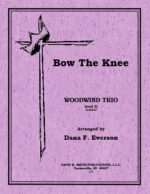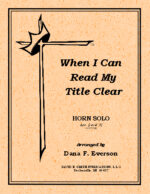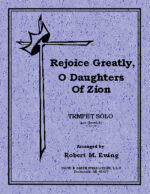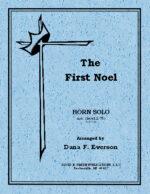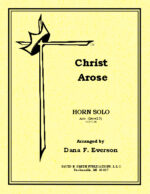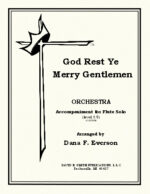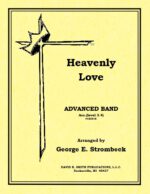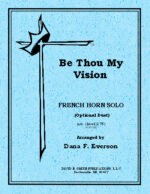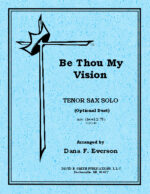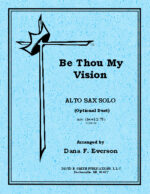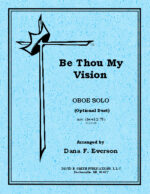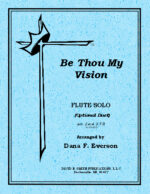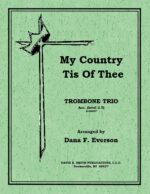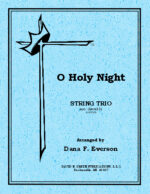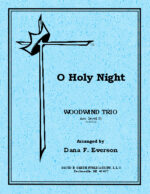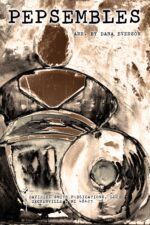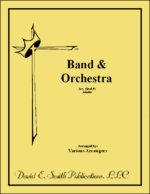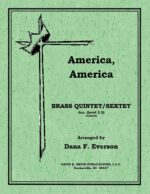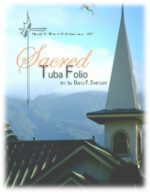-
Bow The Knee
$10.50Published with multiple woodwind parts for each of the three voices plus piano. The piece begins with a rather traditional solo and then joined by an imitative second part. The piece continues in block harmonies and then breaks into contrapuntal movement. With a modulation, the parts become more ornamented. A break is then created with the piano carrying the Fl; Ob/Cl; Cl/Asx; (opt:Asax/Cl/Bssn) and pianomelodic material and then joined with the trio parts moving together producing solid harmonies. Then, in traditional fashion the piece concludes in a manner of repose.
-
When I Can Read My Title Clear
$4.50This horn solo begins with a fanfare styled motive of the theme and then calms down to a florid presentation of the tune with a sweeping counterline in the piano. The second section is an imitative interplay between the parts moving into an extended presentation of the melody. The final section is a rather pompous march based on the tune and then moves to a more lyrical movement- much the beginning.
-
Hallelujah Chorus
$5.00A solo instrument with piano accompaniment? Can an arrangement capture the essence of the original with the majesty of full chorus and orchestra? This piece really does- it is amazingly complete!
-
The First Noel
$4.00The introduction is a rousing declamation of a motive from the theme. The theme is presented in tact while the accompaniment supports with a delightful (music-box) movement. The next section is reflective with more counterpoint and then interrupted with a flair of accented variations. The final section concludes with much of the opening flavor and establishes the story with a solid cadence.
-
Christ Arose
$4.50This French horn solo opens with a sense of an early morning awakening and then breaks into a gently modified rendition of the tune. The second section becomes more spirited with a sense of expectation and then settles back down into the mood of the opening, only to become enlivened again. The final section recaps the material from earlier sections and then ends with a statement of victory!
-
Amazing Grace
$4.00After a brief introduction this French horn solo present the tune “as is” while the piano uses two-part imitation lines underneath. The piece progresses with the horn line modifying the tune rhythmically. After a modulation the piano presents the melody in an altered form while the solo has a gentle obligatto. The final section is more punctuated moving to a solemn section of repose.
-
God Rest Ye Merry Gentlemen
$49.00A flute solo with orchestra presents itself with a sense of flair- much in a rhapsodic fashion. It has continual embellishment of the theme. Very merry! Very joyful!
-
Of Honor and Duty
$49.00Of Honor and Duty is an overture suggesting two traits of dignified character.
A brief, slow introduction in F Major featuring a horn solo over a timpani roll, is followed by a rhythmic, accented, brass figure supported by percussion and colorful woodwind embellishments. The second part of this section features a contrasting melody in woodwinds braced by an alto saxophone solo. The brass return, and the first section of the overture slows to a meditative 3/4 section in Bb Major. The main theme then returns in F Major, culminating in a final noble punctuation by brass and percussion with woodwind flourishes. Dedicated to Mr. David E. Smith -
Be Thou My Vision (Opt. Duet)
$4.50This violin solo begins with non-thematic material setting up the mood of the piece. The theme is then introduced in a back-and-forth format between the instrument and accompaniment. It then continues with an altered tune and conventional accompaniment in the background. After modulating upward, the piece becomes more active both rhythmically and theme alterations. The extended final section is flowing where it ends with a strong statement. Optionally, this piece can be used a duet).
-
Be Thou My Vision (Opt Duet)
$4.50This French horn solo begins with non-thematic material setting up the mood of the piece. The theme is then introduced in a back-and-forth format between the instrument and accompaniment. It then continues with an altered tune and conventional accompaniment in the background. After modulating upward, the piece becomes more active both rhythmically and theme alterations. The extended final section is flowing where it ends with a strong statement. Optionally, this piece can become a duet with the tenor sax or French horn sets).
-
Be Thou My Vision (Opt. Duet)
$4.50This tenor sax solo begins with non-thematic material setting up the mood of the piece. The theme is then introduced in a back-and-forth format between the instrument and accompaniment. It then continues with an altered tune and conventional accompaniment in the background. After modulating upward, the piece becomes more active both rhythmically and theme alterations. The extended final section is flowing where it ends with a strong statement. Optionally, this piece can become a duet with the tenor sax or French horn sets).
-
Be Thou My Vision (Opt. Duet)
$4.50This alto sax solo begins with non-thematic material setting up the mood of the piece. The theme is then introduced in a back-and-forth format between the instrument and accompaniment. It then continues with an altered tune and conventional accompaniment in the background. After modulating upward, the piece becomes more active both rhythmically and theme alterations. The extended final section is flowing where it ends with a strong statement. Optionally, this piece can become a duet with the flute, clarinet, alto sax sets).
-
Be Thou My Vision (Opt. Duet)
$4.50This clarinet solo begins with non-thematic material setting up the mood of the piece. The theme is then introduced in a back-and-forth format between the instrument and accompaniment. It then continues with an altered tune and conventional accompaniment in the background. After modulating upward, the piece becomes more active both rhythmically and theme alterations. The extended final section is flowing where it ends with a strong statement. Optionally, this piece can become a duet with the flute, clarinet, alto sax sets).
-
Be Thou My Vision (Opt duet)
$4.50This oboe solo begins with non-thematic material setting up the mood of the piece. The theme is then introduced in a back-and-forth format between the instrument and accompaniment. It then continues with an altered tune and conventional accompaniment in the background. After modulating upward, the piece becomes more active both rhythmically and theme alterations. The extended final section is flowing where it ends with a strong statement. Optionally, this piece can be used a duet).
-
Be Thou My Vision (Opt duet)
$4.50This flute solo begins with non-thematic material setting up the mood of the piece. The theme is then introduced in a back-and-forth format between the instrument and accompaniment. It then continues with an altered tune and conventional accompaniment in the background. After modulating upward, the piece becomes more active both rhythmically and theme alterations. The extended final section is flowing where it ends with a strong statement. Optionally, this piece can become a duet with the flute, clarinet, alto sax sets).
-
Holy, Holy, Holy
$13.00This sextet takes a different twist on what is typically a reverent piece and makes it majestic. From the traditional 4-4 meter it is presented in 6-8 giving it a lilt. The trumpets weave in and out with the melodic material while the other brass parts punctuate the lines. The second section is much in a fugal structure (in 4-4) and then gravitates back to 6-8 swapping the theme between the upper and lower parts. The contrapuntal activity increases as the tension mounts ending with a bold proclamation.
-
Is Your All On The Altar?
$9.50A woodwind trio or quartet with piano accompaniment and optional guitar. Woodwind parts are for flute and clarinet with optional part oboe, clarinets and alto sax. After a brief introduction the flutes introduce the tune and then answered by the clarinet. The flute and clarinet answer back and forth until all parts move in block harmony with rhythmic alterations. After a modulation the ensemble continues in block harmonic movement until punctuated by the inner parts. While the color remains consistent to the end, the melody moves about amongst the parts until final resolution.
-
O Come All Ye Faithful
$9.00A trombone trio with optional horn and BHTC parts with piano. After an opening fanfare in the brass the instruments break out into a three part harmony of the tune and rythmic modifications. The theme returns in the third part and then joined by the upper parts in fanfare-like motifs. The final section is modulated to a key that elevates the piece with final fanfare conclusions.
-
O Holy Night
$8.50Published with parts for violin, violin/viola and cello plus piano. The piece begins with a rather traditional solo and then joined by an imitative second part. The piece continues in block harmonies and then breaks into contrapuntal movement. With a modulation, the parts become more ornamented. A break is then created with the piano carrying the melodic material and then joined with the trio parts moving together producing solid harmonies. Then, in traditional fashion the piece concludes in a manner of repose.
-
O Holy Night
$9.50Published with multiple woodwind parts for each of the three voices plus piano. The piece begins with a rather traditional solo and then joined by an imitative second part. The piece continues in block harmonies and then breaks into contrapuntal movement. With a modulation, the parts become more ornamented. A break is then created with the piano carrying the melodic material and then joined with the trio parts moving together producing solid harmonies. Then, in traditional fashion the piece concludes in a manner of repose.
-
Pepsembles- Full set- SAVE
$95.00one of each book as a full set. Mix-n-match instrumentation activity book for pep bands and other venues Information on the “Pepsembles” series.
-
Wedding Marches
$49.95Hymnsemble Format (see Hymnsembles) as a band or orchestra set including separate arrangements of “The Bridal Chorus” and “Here Comes The Bride.”
-
Pepsembles- Bass clarinet
$6.95Mix-n-match instrumentation activity book for pep bands and other venues Information on the “Pepsembles” series.
-
Hark The Herald Angels Sing
$12.00This brass quintet with piano can also be used as a sextet with the optional parts. It is presented in a march style incorporating “My Country Tis Of Thee,” and “America The Beautiful”. The piece is of moderate difficulty but because of the way the scoring passes the parts around there is a variety of tonal color as well as rhythmic movement.
-

